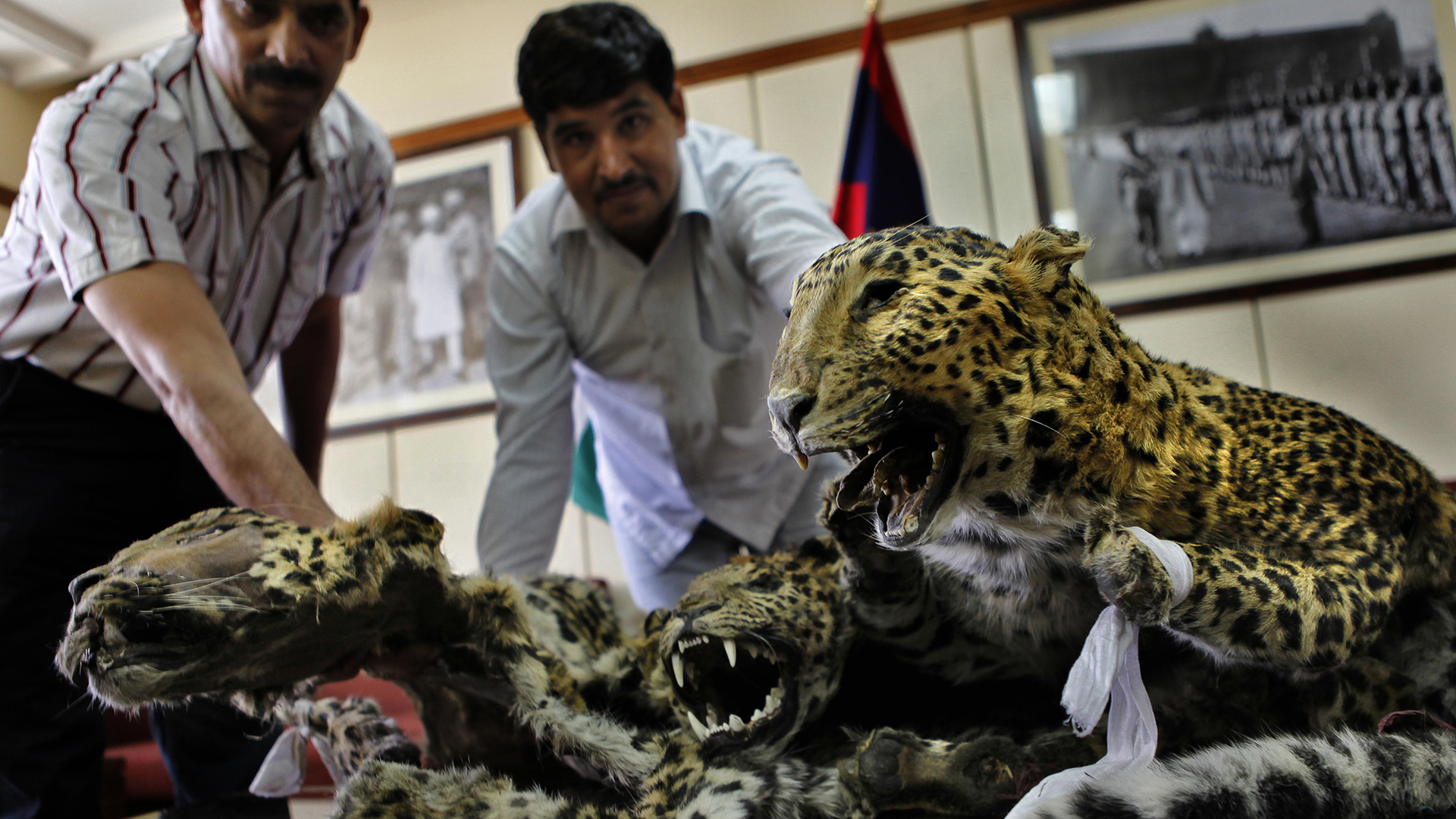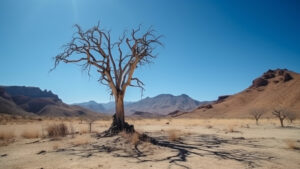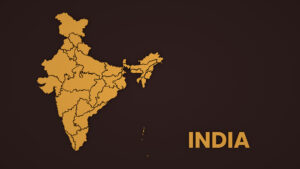NEW DELHI, INDIA – MAY 5: Delhi Police has arrested one poacher with the three leopard skins on May 5, 2012 in New Delhi, India. He used to poach the endangered cats in Jungles of Himachal Pradesh and smuggle them to foreign countries. According to some experts around 130 leopards are poached every year in India. (Photo by Raj K Raj/ Hindustan Times via Getty Images)
Poaching is an illegal act of hunting and captivating wild animals in a clandestine way. In India, superstitious beliefs, the needs of elite people and greed fuel poaching. Cobras, crocodiles, elephants, tigers, leopards, deer, pangolin, monitor lizards, and rhinoceros are the ones that have the highest threats. Other than these animals, some elite people hunt exotic birds, wild boars and hares for meat.
Earlier, poaching was carried out only in a few reserve forest areas, and due to higher demands in the global markets, these activities are on the rise and spread across India. As wildlife crimes are more organized, conserving wildlife in India has become hard. Establishing trade connections and execution of wildlife crimes relies on the advantage of the dark web and with the help of advanced technologies.
DEMANDS IN THE MARKET FOR THE WILDLIFE TRADE
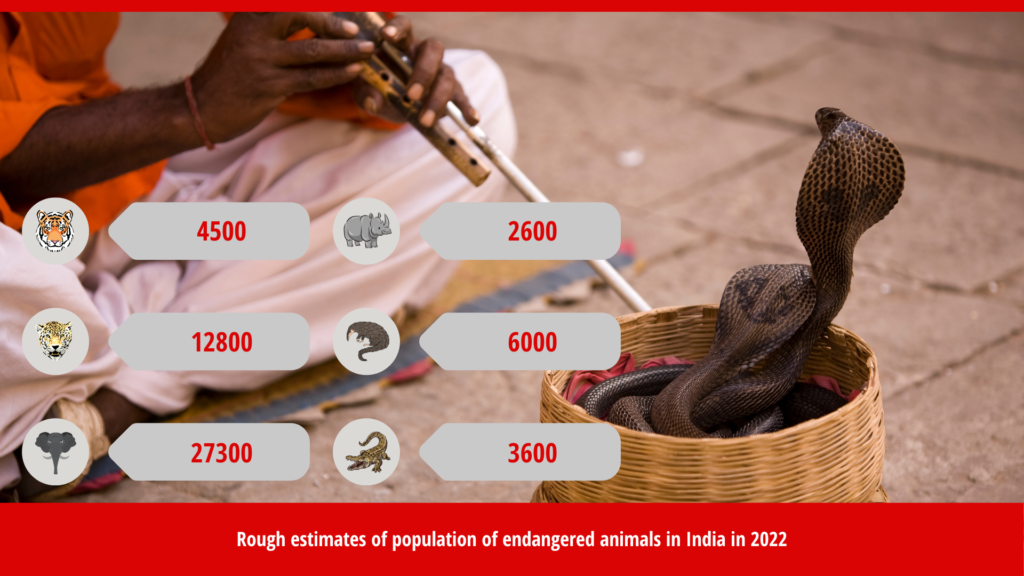
Cobras
Purpose: cobras (including king cobras) are captivated and killed with the fictitious belief that these innocent reptiles carry a sacred gem (locals call that “Nagamani”) that offers extensive wealth to the bearer. Some occultists in India use the cobras in their esoteric procedures to achieve their objectives. Apart from that, some Asian countries use cobras to prepare unusual snake wine (traditionally called medicinal liquor in China) and traditional medicine.
Poaching Ground: Northeast India, Karnataka, Rajasthan, Gujarat, Madhya Pradesh and Odisha.
Crocodiles
Purpose: poaching of crocodiles is mostly for skin to produce various leather products and rarely for meat. The reported poaching cases are very few compared to other wildlife.
Poaching Ground: Andaman & Nicobar Islands, Sunderbans in West Bengal, Andhra Pradesh, Chattisgarh and Odisha.
Elephants
Purpose: poaching of elephants is mainly for ivory, skin and organs. In rare cases, elephants are killed for a superstitious reason to extract a sacred gem (called “Gajamoti”). According to beliefs, this sacred gem exists in the head of an elephant.
Poaching Ground: Kerala, Karnataka, Tamil Nadu, Odisha, Chattisgarh, Jharkhand and West Bengal.
Deers
Purpose: poaching of deers are mostly for skin and meat. Captivating and hunting musk deers are especially to extract “Kasturi”, a fragrance pod found in the deer. Some spiritualists believe deer skin mats are sacred for meditation and spiritual upliftment.
Poaching Ground: Assam, Chattisgarh, Madhya Pradesh, Karnataka, Tamil Nadu and Uttar Pradesh.
Leopards
Purpose: poaching of leopards are for claws, bones, skin and whiskers. According to esoteric beliefs, a leopard’s claw or teeth embedded in a neck chain wards off evil spirits and bestows ample wealth to the wearer. Some tantriks in India consider leopard skin mats for spiritualistic purposes.
Poaching Ground: Madhya Pradesh, Uttarakhand, Uttar Pradesh, Himachal Pradesh, Odisha, Maharastra, Chattisgarh, Andhra Pradesh, Goa, Bihar, Jharkhand, Karnataka, Kerala and Tamil Nadu.
Pangolins
Purpose: poaching of pangolins (scaly ant-eating mammal) are mainly for scales, blood and meat. Pangolins’ scales and blood are used in traditional Chinese medicine to prepare medicinal extracts and oils for treatment.
Poaching Ground: Assam, Madhya Pradesh, Manipur, Mizoram, West Bengal, Odisha and Tamil Nadu.
Rhinoceros
Purpose: rhinoceroses are hunted mostly for horns, considered highly valued in traditional Chinese medicine and used to produce aphrodisiacs in the middle east.
Poaching Ground: Assam.
Tigers
Purpose: poaching of tigers are for claws, bones, skin and whiskers. Since the tiger is associated with the Indian Goddess “Chamundeshwari”, some occultists believe that a tiger’s claw, teeth or whiskers embedded in jewellery ward off evil spirits and bestow immense power and wealth to the wearer. Some tantriks believe tiger skin mats are more sacred for spiritual upliftment. The organs of tigers are extracted and used in traditional medicine in China and Tibet.
Poaching Ground: Uttarakhand, Madhya Pradesh, Kerala, Manipur, Maharashtra and Uttar Pradesh.
Other than for the wildlife mentioned above, for superstitious reasons, jackals are poached for the horn found on their skull called “Siyar Singhi”, and monitor lizards for hemipenis called “Hatha Jodi”, both are considered as a lucky charm in northern parts of India. Some varieties of tortoises or turtles are kept as pets as they are believed to bring good fortune.
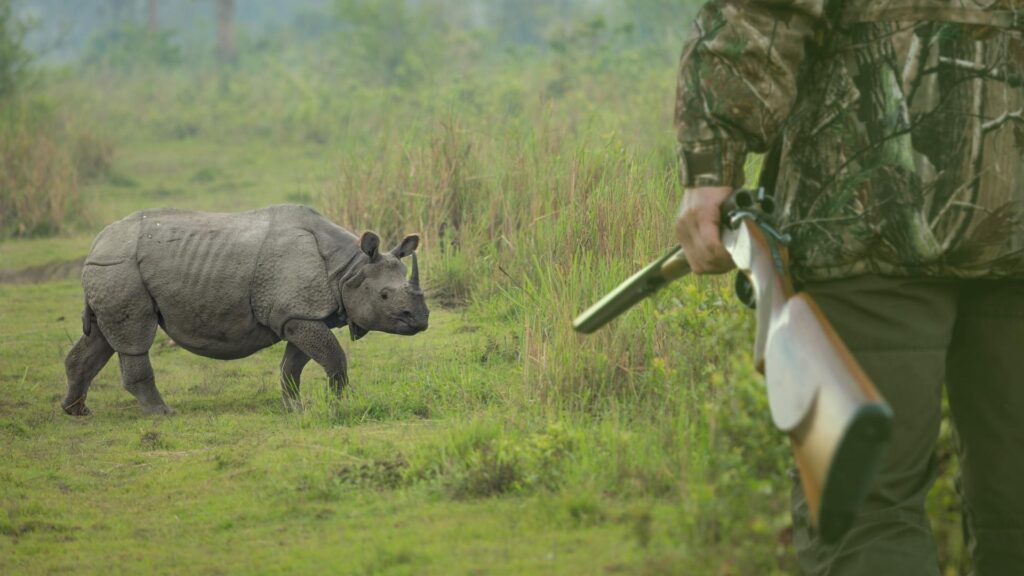
CAUSES
1. Creating roads or pathways that allow poachers to access the interiors of reserve forest areas.
2. Expansion of cities, infrastructures and land encroachment for human settlements disturbs the wildlife and may cause habitat loss.
3. Need for exotic cuisine and demand for animal products from the elite group of people.
4. Baseless superstitious beliefs among people and medical significance without any scientific proof.
5. Corruption and broken regulations in the system create a secure channel for poachers to carry out their criminal activities.
6. Some tribals associate either greed for money or survival with criminal networks aiding in supplies.
CONSEQUENCES
Illegal poaching leads to the extinction of wildlife and causes ecological imbalance. Animals are the beautiful creatures of this world and have the right to live like humans; the constrained habitat may make them suffer. Animals indirectly work for the benefit of humans, while humans are the only threat to the animal kingdom. Exposure to wildlife and involvement in the extraction of animal body parts, their processing, storing and transporting poses high risks to human health and become a core cause of deadly viral infections. Wildlife is one factor that encourages tourism; in turn, tourism contributes to the economy, and poaching indirectly threatens the nation’s economic development.
PREVENTING WILDLIFE CRIMES
Common people as consumers play a vital role in preventing wildlife crimes in several ways and may extend our support by banishing the use of wildlife products that, results in a declination of demand in the markets that discourages criminal activities. Possessing the body parts of an innocent animal by harming them can never be a good luck charm to anyone but rather a grave sin, so free yourself from superstitious beliefs.
In India, forest authorities predominantly handle the actions to prevent poaching and wildlife crimes. The conviction rate in India is very less for wildlife crimes. Imposing rigorous punishment on the convicts and amending more stringent provisions in the respective laws may help avoid repeated offences.

